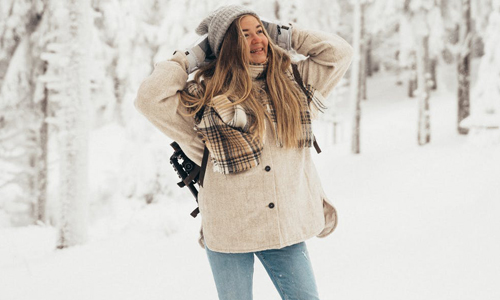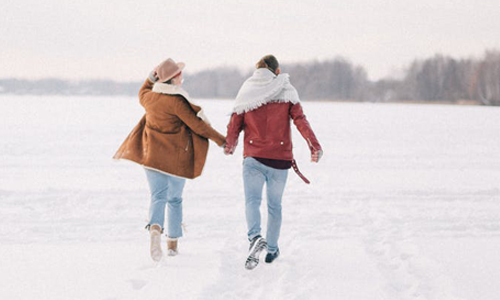Ways to Enjoy Winter Walking
There are various benefits of staying outdoors and being one with nature. As per research, walking in nature improves your memory and attention span. The impact of nature is so powerful on mind and body that even doctors prescribe nature and outdoors to treat depression, anxiety and stress related problems.
However, with winter many things change apart from just mercury falling below the average. The days become shorter and the nights longer. It also affects your daily routine ad clothing options. One thing that does not change is your walking habits. If you have the habit of walking, then there is no need to stop that during the winters. Make the most of the season change. Staying active all year round helps your body in different ways.
Planning a winter walk is no cakewalk but you have to keep lots of things in mind before you start doing so.

Clothing Essentials
If you are going for a normal brisk walking or a job alongside the road or a park, clothing needs to be done accordingly. Wear a boot with a firm grip so that the wet or slippery roads do not bother you. On the other hand, if you are going for a little higher altitude, consider picking your gears carefully like an ice axe and mountaineering boots.
Keeping Warm
When you start winter walking, the most obvious factor is the warmth. So, you have to layer wisely to ensure that you do not overheat yourself. Give extra attention to accessories like wearing a hat and gloves. When you are walking in winter, it is mostly the wind and the rain that bothers you. Thus, when you are outside, it is the capacity of wind and wet that takes away the warmth so being prepared pays off.
Walking the Winter Trail
Ice can transform a path even when there is no snow. Carrying the essential gear helps you on the road Thus, when you are navigating rough wintery terrain, the skills are best acquired rather than learned. The accessories are only there to help you but the real skill lies with you on how to overcome challenges like rain, mist, and snow.

Avoid Navigation Errors
There are various natural causes or disasters which might impair your navigation skills. You must also remember that navigation errors are the root cause of many accidents. Exhaustion levels also increase when navigation errors add miles and hours to your route.
Walking under the clear sky, bright sun and dry underfoot is quite a pleasant experience but that is the summer story. In winter, you need to stay prepared when you are walking in the snow. The conditions during the winter change within the blink of an eye, so taking the necessary gear along with you is important for the winter walking experience. You learn the most survival skills while on road so stay focused and use the gear whenever possible. This will ensure that your winter walk is a marvelous one.
Observe Your Surroundings
Winter might seem quite lifeless but at the end of the day observing your surroundings can help you more. So, while you are camping or hiking in the cold and snow, it is important to look out for trails left by animals or plants that have leaves and berries on them. It shows signs of life and wildlife dwellings giving you better hint at where you should camp.
Also, for people who love birdwatching, there could not be a better time as the branches stay bare and observing the birds becomes easier than ever.
Categories
- Sport (28)
- Product Reviews (3)
- Team Outdoor Look (7)
- Mike Wild (2)
- Mike Payton (2)
- Suse Hammond-Pears (3)
- Snowboarding (12)
- Latest Offers (105)
- Shop Talk (1)
- Competitions (7)
- Walking (413)
- Lifestyle Fashion (8)
- Travel (86)
- Kit Guides (176)
- Workwear Clothing (6)
- Safety Workwear (4)
- Health/Fitness (289)
- Skiing (91)
- Great Outdoors (1316)
- Cycling (92)
- January 2025
- December 2024
- November 2024
- October 2024
- September 2024
- August 2024
- July 2024
- June 2024
- May 2024
- April 2024
- March 2024
- February 2024
- January 2024
- December 2023
- November 2023
- October 2023
- September 2023
- August 2023
- July 2023
- June 2023
- May 2023
- April 2023
- March 2023
- February 2023
- January 2023
- December 2022
- November 2022
- October 2022
- September 2022
- August 2022
- July 2022
- June 2022
- May 2022
- April 2022
- March 2022
- February 2022
- January 2022
- December 2021
- November 2021
- October 2021
- September 2021
- August 2021
- July 2021
- June 2021
- May 2021
- April 2021
- March 2021
- February 2021
- January 2021
- December 2020
- November 2020
- October 2020
- September 2020
- August 2020
- July 2020
- June 2020
- May 2020
- April 2020
- March 2020
- February 2020
- January 2020
- December 2019
- November 2019
- October 2019
- September 2019
- August 2019
- July 2019
- June 2019
- May 2019
- April 2019
- March 2019
- February 2019
- January 2019
- December 2018
- November 2018
- October 2018
- September 2018
- August 2018
- July 2018
- June 2018
- May 2018
- April 2018
- March 2018
- February 2018
- January 2018
- December 2017
- November 2017
- October 2017
- September 2017
- August 2017
- July 2017
- June 2017
- May 2017
- April 2017
- March 2017
- February 2017
- January 2017
- December 2016
- November 2016
- October 2016
- September 2016
- August 2016
- July 2016
- June 2016
- May 2016
- April 2016
- March 2016
- February 2016
- January 2016
- December 2015
- November 2015
- October 2015
- September 2015
- August 2015
- July 2015
- June 2015
- May 2015
- April 2015
- March 2015
- February 2015
- January 2015
- December 2014
- November 2014
- October 2014
- September 2014
- August 2014
- July 2014
- June 2014
- May 2014
- April 2014
- March 2014
- February 2014
- January 2014
- December 2013
- November 2013
- October 2013
- September 2013
- August 2013
- July 2013
- June 2013
- May 2013
- April 2013
- March 2013
- February 2013
- January 2013
- December 2012
- November 2012
- October 2012
- September 2012
- August 2012
- July 2012
- June 2012
- May 2012
- April 2012
- March 2012
- February 2012
- January 2012
- December 2011
- November 2011
- October 2011
- September 2011
- August 2011
- May 2010
- April 2010
- March 2010
- February 2010
- January 2010
- November 2009
- October 2009
- September 2009
Submit a Comment